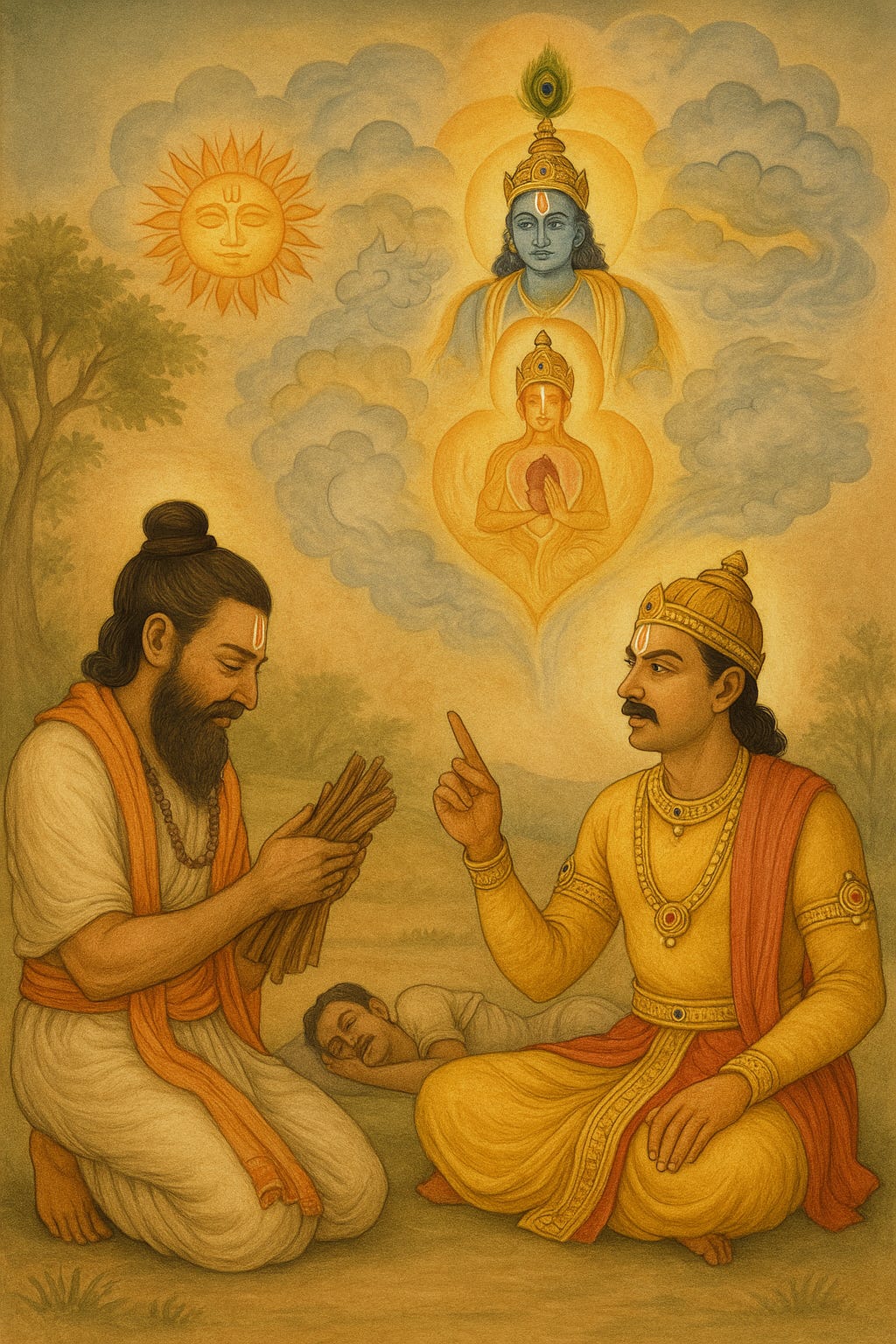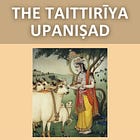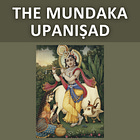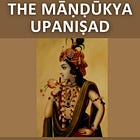The sixteen manifestations of the Lord: The debate of Ajātaśatru and Bālākī from the Kauṣītaki Upaniṣad
Deciphering another mysterious passage, this one from the Kauṣītaki Upaniṣad
The Kauṣītaki Upaniṣad contains passages from the Ṛgveda. It is a profound, but difficult text, that emphasizes the Supremacy of the Lord and devotional service to Him as the ultimate goal of life. Most translations available don’t go deep into the conclusions, but when the text is interpreted in the light of the conclusions from Srila Prabhupada and previous ācaryas, the text opens up.
There are two very instructive passages in this Upanisad: Indra identifying himself wth the supreme Brahman (which we will explore in another article) and the passage with the discussion of Bālākī and Ajātaśatru described in the fourth adhyāya of the text. This is the topic for today.
In the description, Gārgya Bālākī approaches the king of Kāśi, Ajātaśatru, and promises, "I shall tell you about Brahman". The King immediately becomes receptive and promises to give him a thousand cows in charity for such precious knowledge.
Bālākī then describes Brahman as the great puruṣa in the sun, the sun-god, stating that it is he whom he venerates. Ajātaśatru, however, rejects this understanding, stating that the sun is just one of the aspects of the supreme, representing his greatness:
sa hovāca bālakiḥ evaiṣa āditye puruṣas tam evāham upāsa iti, taṁ hovācājātaśatruḥ māṁ tāvan mā sambrūthā iti, aham evainaṁ bhūtānāṁ śiro ’ham upāsa iti, sa ya etam evam upāste śiro bhūyān bhavati
"Bālākī declared: Indeed, this great puruṣa in the sun (the demigod) is the one I worship. Ajātaśatru replied: Do not tell me such things! I worship him only as the head of all beings. One who worships him as such becomes great as the leader of all." (Kauṣītaki Upaniṣad 4.3)
Ajātaśatru worships Brahman in the sun, but not as the sun-god. He worships Him as the power who is behind the demigod. He sees the sun-god not as the Supreme, but as the representative of his power, stating that one who worships him as such also attains greatness. In other words, Bālākī offers a process of deva-upāsanā (worship of a demigod), but Ajātaśatru rejects it and instead gives the proper process of brahmopāsanā (worship of the Supreme Brahman), worshiping the Supreme Lord manifesting through the sun.
Bālākī then defines Brahman as the puruṣa of the moon, stating that the moon is his object of worship, just to be again rejected by Ajātaśatru, who accepts him just as a great king, Soma, who participates in the maintenance of the cosmic order by nourishing the vegetables. Again, Ajātaśatru sees the demigod as a representative of the Supreme, while Bālākī speaks a superficial, pantheistic philosophy, seeing the different material manifestations and their predominating deities, but failing to see the unifying principle behind them.
Bālākī then continues to describe his pantheistic process, describing the worship of the deities of lightning, thunder, wind, ether, fire, water, reflection, shadow, echo, sound, dream, body, speech, and truth.
In this way, Bālākī described sixteen different puruṣas, just to be similarly rejected at each step by Ajātaśatru, who, although a kṣatriya, had a deeper knowledge than him. Bālākī had just knowledge of the external manifestations, while Ajātaśatru knew the unifying principle behind all of them. Finally, Bālākī fell silent.
tata u ha bālākis tūṣṇīm āsa, taṁ hovācājātaśatrur etāvan mātraṁ bālaka iti etāvad iti hovāca bālakiḥ, taṁ hovācājātaśatrur mūrkha eva khalu mā samavad iṣyaḥ, brahma te bravāṇīti yo vai bālaka eteṣāṁ puruṣāṇāṁ kartā yasya caitat karma sa vai veditavya iti
"After speaking thus, Bālākī fell silent. 'Is that all, Bālākī?' asked Ajātaśatru. 'That's all', replied Bālākī. Ajātaśatru then said to him: In vain have you dragged me into a discussion with you by saying: 'Let me tell you about Brahman.' O Bālākī, He who is the creator of these sixteen puruṣas, He by whom this karma (universe, jagat) is made, he alone is to be known. He is the real Brahman." (Kauṣītaki Upaniṣad 4.18)
Bālākī realizes the depth of Ajātaśatru's realization and surrenders to him as his disciple. Although hesitant, Ajātaśatru agrees to instruct him in what he knows. This leads to the second part of the passage, which encompasses verses 4.19 and 4.20, closing the chapter:
tata u bālākir samīpāṇīt, praticakram upāyānīti, taṃ hovāca jātaśatruḥ: pratilomam rūpam evaitad manye, yad asya śriyo brāhmaṇo ’paman-yeta, eṣa vai tvā śayyāpayiṣyāmīti, tau ha pāṇī abhipra pravrajā, tau ha suptaṃ puruṣam ājagmatuḥ, taṃ hovāca jātaśatruḥ: ānamyāṅkāreṇa bṛhann, aṇḍadaravāsaḥ, somo rājā iti, sa u ha śirasy eva, tata u hainaṃ yakṣyam vicikṣepa, sa tata eva samutastau
"Then Bālākī approached him with firewood in his hand, saying, 'Let me accept you as my guru.' Ajātaśatru said: 'I consider it unnatural for a kṣatriya to be the guru of a brāhmaṇa. Come, I will tell you what I know.' Then, taking Bālākī by the hand, Ajātaśatru went out. They came to a man asleep. Ajātaśatru called out to him, 'O King Soma!' (O person who entered into deep sleep) But he did not hear. Then Ajātaśatru poked him with a staff, and the man immediately got up."
When we enter into deep sleep, the consciousness withdraws from the senses and takes shelter inside the heart. At this stage, we lose external consciousness and can't see, hear, or feel. We can see that in modern medicine, this state is induced by administering anesthetics, allowing doctors to perform surgeries while the patient is unconscious. This shows that the consciousness withdraws completely, to the point where one can cut our body. Until the consciousness returns to the awake state, we don't feel anything.
However, the consciousness is still there, and eventually we awake from this deep sleep. This proves that the soul is different from the external consciousness we display when awake and different from the physical body itself. In this way, Ajātaśatru teaches the foundation of transcendental knowledge, the difference of body and soul.
taṃ hovāca jātaśatruḥ: vaivai etad bālāka puruṣo ’śayiṣṭa kva etad bhūtaṃ kṛtaṃ kva etad gata iti, tata u ha bālākir vijajñe, taṃ hovāca jātaśatruḥ: eṣa etad bālāka puruṣo ’śayiṣṭa yantram ūrdhataḥ, etad gātrāgata iti, hitā nāma puruṣasya nāḍyaḥ hṛdayād uparitaḥ abhyantaram anti, tathā ayaṃ sahasradhā keśo vipacitās tat evadvyāḥ — piṅgalāḥ, śyāmāḥ, tiktāḥ, śuklāḥ, kṛṣṇāḥ, pītāḥ, lohitāś ca, tāsu tadā bhavati yadā suptaḥ svapnaṃ na kañcana paśyati
"Ajātaśatru said: 'O Bālākī, where does this person go to rest while he sleeps? From where does he return when he awakes?' Bālākī was confused and did not know what to answer. Ajātaśatru then explained: This person, O Bālākī, when he sleeps, withdraws into the body’s system, taking shelter within. Inside the body, there are subtle channels called nāḍīs, spreading inside and upward by the thousands and in many colors. These subtle channels are centered around the heart. It's there that a person enters when in deep, dreamless sleep."
Since the soul is different from the body, it means we go somewhere while in deep sleep. The question is where, since the soul is still present inside the body, sustaining life. This allows Ajātaśatru to reveal the next level of the spiritual science: knowledge about Brahman. The Lord resides inside the heart, and while in deep sleep, the consciousness of the soul withdraws to inside the heart, where we associate with Him. The Lord is present in the hearts of all, including all the deities previously enumerated by Bālākī. A neophyte sees the external manifestation, while a true transcendentalist worships the Lord who dwells within each of them.
athāsmin prāṇa evaikadhā bhavati, tad vai idaṃ vāṅmanāḥ cakṣuḥ śrotraṃ sarve rūpe sahopayanti, śrotre sarve śabde sahopayanti, manaḥ sarvedhyāni sahopayanti, sa yadā pratinudyate yathāgnir jvalitaḥ sarvā diśo viṣphuliṅgāḥ vipratiṣṭhante, evam etasmād ātmanaḥ prāṇāḥ yathāyatanaṃ vipratiṣṭhante, prāṇebhyo devāḥ, devebhyo lokāḥ
"During this state of deep sleep, the consciousness of the soul rests into prāṇa (the Lord, as Paramātmā), becoming united with Him. All faculties of the senses merge together. In the ear, all sounds unite, and thus one hears nothing. In the mind, all cognition unite, and can't feel or think anything. When one wakes up, the vital functions again spread out to their respective seats (the sense organs), just as the sparks of a blazing fire scatter in all directions. From this prāna (the Supreme Lord) come the devas, and from the devas the whole material creation sprouts."
In deep sleep, the soul merges into the Lord (described here as prāṇa), just as we merge into the body of Mahā-Viṣnu at the end of creation. In this state, all mental and sensorial functions merge into their source, and the external senses stop working. This shows that the external consciousness is a mere projection from this inner self. In the same way, all the deities mentioned by Bālākī are manifestations of the Supreme Brahman. He is not only the source of their powers, but also their maintainer.
sa eṣa prāṇa eva prajñātmā idaṃ śarīram ātmānam anupraviśya ā lomabhya ā nakhebhyaḥ, tathāyaṃ dhuraḥ dhuraghnaḥ aśvapo hitaḥ viśvambharo vā viśvambhara-kulāya, evam eva eṣa prajñātmā idaṃ śarīram ātmānam anupraviśya ā lomabhya ā nakhebhyaḥ, tena etām ātmānam eta ātmā na oṣṇavan vasante, yathā śreṣṭhīnaḥ svāḥ, tathaiva śreṣṭhīḥ svaiḥ bhṛtyaiḥ, evam eva eṣa prajñātmā sarvāṇi bhūtāni ātmānam evābhipraviśya, prajñātair etāni abhibhūtāni, evam evaitad ātmānaṃ etātmānaṃ bhuñjate
"This prāna is the Supreme Lord, the Supreme Self, the source and indwelling principle of all knowledge and consciousness. He pervades the entire body, from the hair down to the nails. Just as yoked bulls pulling a cart, all the individual beings follow this Supreme Soul. It's because of His presence that the body continues to function instead of perishing in affliction. Just as a rich man is served by his servants, this prajñātmā enters all beings as their inner self and governs them. Indeed, all these beings live upon Him and are sustained by Him."
The real self is not the body, but the soul within. This jīva, however, is just a tenant; the landlord is Viṣnu. It's only by his presence that life is possible. Without him, nobody could survive even for a moment. The jīvas are thus compared to bulls pulling a cart, or servants working for their master, because they are not only dependent on the Lord, but are in fact under His complete control, be it directly, by surrendering unto Him, or indirectly, through the influence of the three material modes. The Lord is the essence of everything and maintains everything. All other beings work merely as pieces of the universal manifestation set up by Him.
sa yāvad vā indra etam ātmānaṃ na vijajñe, tāvad enam asurā abhibabhūvuḥ, sa yadā vijajñe, atha hatvā asurān abhijitya sarveṣāṃ devānām śraiṣṭhyaṃ svarājyaṃ ādhipatyaṃ paryait, tathā evam eva vihan sarvāṇi bhūtāni apahatya, sarveṣāṃ ca bhūtānāṃ śraiṣṭhyaṃ svarājyaṃ ādhipatyaṃ paryeti, ya evaṃ veda, ya evaṃ veda
"As long as Indra did not know this Supreme Soul, the asuras defeated him. However, when he came to know this Supreme Self, he smashed the demons, conquered them, and secured the supremacy, sovereignty, and lordship over all the devas. Similarly, here too in this world, whoever realizes this Self, overcomes and transcends all obstacles, attaining supremacy, sovereignty, and lordship over all. Yes, he does, whoever knows this."
The Lord is the source of power for everyone. Indra is not powerful because of his own strength; he is powerful because of his connection with the Lord. By his own strength, he is weak and is easily defeated by the demons, but when he is strongly connected with the Lord, acting as his representative, he can smash the demons and secure supremacy over the celestial system. Similarly, as long as we remain ignorant of the glories of the Lord, we remain defeated and bound by demoniac qualities, such as lust and greed. On the other hand, when we realize our eternal nature as servants of the Lord, we conquer ignorance and surpass all obstacles.
The sentence "sarveṣāṃ ca bhūtānāṃ śraiṣṭhyaṃ svarājyaṃ ādhipatyaṃ paryeti" can be interpreted both literally, that one becomes a great king or demigod, attaining sovereignty and lordship over others, or in the higher meaning, in the sense of overpowering all limitations of conditioned life and controlling one's body, mind, and senses, gaining sovereignty over them and becoming a prabhu, a master of one's senses, opening one's path to perfection. This is certainly much more valuable than becoming a mere king of this world.
If you read this article to the end, give it a like. This makes Substack recommend it to more people.
Read also:





